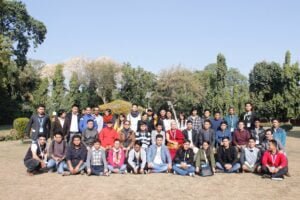The two months youth initiative “CONFLUENCE 2016” was finally brought to a successful conclusion on 29th January 2016. The fieldwork was initiated on 27th Nov 2015 in New Delhi and further carried on to Jammu three times and Chandigarh four times respectively for pre-event activities.
Approximately 300 people in Chandigarh and 1000 in Jammu attended the five-day successive events of Confluence 2016, from 7th to 11th Jan 2016. The key speaker of Confluence 2016, Geshe Dorji Damdul, Director, Tibet House, Cultural Centre of His Holiness the Dalai Lama, Delhi beautifully enriched the participants on the topic “Confluence of Modern Science, Philosophy and Psychology” on the second day. The diverse participants included eminent guests, speakers, scholars and students of Jammu and Chandigarh.
The panel discussion on “Youth empowerment; Societal development for inner and outer change” was conducted on the first day of Confluence. The panelists were Mr. Stanzin Dawa, Brigadier Ashwani, Dr. Renu Nanda, Mr. Shail Gulhati, Dr. Sunil Kumar Wanchoo, Mr. Ram Singh Slathia and Shri. Nawang Rigzin Jora.
Confluence was jointly organized by Flowering Dharma Centre (for Ethics, Education, Culture and Change), Tibet House (Cultural Centre of H.H Dalai Lama, New Delhi), Rajiv Gandhi National Institute of Youth Development, Regional Centre, Chandigarh and Yakjah (YAKJAH) (Reconciliation and Development Network). This is the first time that such kind of event was jointly organized with the assistance of students of Jammu and Chandigarh where people from different backgrounds, religious and cultural affiliations, participated enthusiastically. All the respective student unions of North Eastern region and Himalayan region equally took initiative to make the event successful. Students from Arunachal Pradesh, Sikkim, Kinnaur and Lahaul – Spiti (Himachal Pradesh), Manipur, Nagaland, Tibet, Leh and Kargil (Jammu and Kashmir) participated in Chandigarh. Students from Jammu, Kashmir and Ladakh (both from Leh and Kargil) region participated and actively took initiative in Jammu for the same. The respective student unions were; All Ladakh Students Welfare Association Jammu (ALSWAJ), Student Association Of Ladakh Jammu (SAOLJ), All Ladakh Students Association Jammu (ALSAJ), All Kargil (Ladakh) Student Association Chandigarh, Ladakh Student Association Chandigarh, Manipur Students Association Chandigarh, Sikkim Student Union Chandigarh, Arunachal Students Union Chandigarh, LahaulSpiti Students Association Chandigarh, Naga Students Union Chandigarh, All Kinnaur Students Association Chandigarh and Regional Tibetan Youth Congress Chandigarh.
The event was held on 7th & 8th January 2016 in Chandigarh, followed by cultural performances from the respective student unions of Kargil, Lahaul – Spiti and Leh. It was immensely delightful and pleasing to watch them perform to the beautiful rhythm of their traditional songs, aptly representing the beauty and diversity emphasizing the spirit of the event. Right after the program in Chandigarh, the Confluence team left for Jammu on 8th January and the event in Jammu was scheduled on 9th, 10th & 11th January 2016. An interactive session with Ven. Geshe Dorji Damdul and 50 selected scholars and students were also organized both in Jammu and Chandigarh. The session was very constructive and proved to be beneficial for all the participants.
Eminent guests like Mr. Tsering Angchok, IAS, Excise Commissioner, J&K also graced the occasion with his presence in Jammu. Mr Lobsang Dhondup Bhutia, Head, Sangye Menla Trust, Chandigarh along with some of his team members also attended the event on both the days in Chandigarh..
Brief summary of the Panel Discussion:
The panel discussion was on “Youth empowerment; Education and societal development for inner change and outer development, Neuroscience/Quantum physics for mental calmness, significance of old Indian tradition for mental illness in youths & educating minds and hearts. The panelists were from varied disciplines and areas of study like academics, defense, politics, youth organization, development sector, sports and so forth.
Mrs. AshimaKaul, Founder of Yakjah gave the welcome speech and focused on the idea of oneness while staying rooted to one’s culture and tradition. She also shared her thoughts on being associated with Confluence.
The panelist for Chandigarh were Ven. Geshe DorjiDamdul, Director, Tibet House, Delhi; Mr. StanzinDawa, Regional Coordinator, RGNIYD, Chandigarh and Brigadier Ashwini Kumar. The panelists for Jammu were Dr. Renu Nanda, Prof. & Head, Department of Education, Jammu University; Shri. NawangRigzinJora, Leader, Congress Legislative Party, J&K; Mr. ShailGulhati, Author and Writer; Dr. Sunil Kumar Wanchoo, Director in charge, School of Innovation and Community Development, SMVDU, Katra; Mr. Ram Singh Slathia, Mountaineer. The moderator for the panel discussion in Jammu was Mr. StanzinDawa, Regional Coordinator, RGNIYD Chandigarh.
Mr. Stanzin Dawa initiated the panel discussion with an introduction of Confluence and its concept of being a democratic, secular and inclusive initiative of young people. It is led and driven by young people for connecting the dots between science and philosophy, between the adults and youths and the heart and the mind. He stressed on the importance of social engagement of the youth in today’s world, as he believes that the future is the baby of our present. If the young people are well informed, educated, sensitive, responsible and socially engaging, then we can predict that the future is going to be more peaceful, safer and sustainable. Youth empowerment is a process and not the end.



Mr. Shail Gulhati talked of the horrors we face every day and mentioned that the breaking news are always the same and are all about terrors, sadness, scams, diseases and conflicts and we wonder what happened to the fairy tales, promised heavens and the divine Buddha fields that we have been told about by our spiritual teachers and gurus. Can’t good things also raise the TRP’s? Why are we bombarded with negativities? Science alone cannot solve all the problems. Thus the antidote to conflict is interconnectedness. It is important for us to read scriptures, introspect, reflect and mediate and reach the divine self that we always were. Buddha is a reminder of your own Buddhahood. He alone cannot attain Buddhahood for you. You have to start your own journey.
Dr. Renu Nanda shared her experience of working in the field of youth empowerment and a small experiment called “craft based literacy” she carried out with the youth of the nearby villages of Jammu. She has the experience of working at the grass root level and has come to know that whatever we usually do not practice what we preach. Youth should be empowered and be given value-oriented education. They should be good in their own fields. She questioned the kind of education provided by the country’s institutions and the curriculum where there is a total detach between theory and practice. Dr. Nanda also pointed out how many a times, the programs for youth empowerment do not reach the youth in the villages. So, a right kind of platform is needed for them to express themselves and realize their potential. She emphasized on the need for careful planning of the course curriculum and that it should be in consonance with our objectives. Also the methodology has to be in consonance with our curriculum, so that the evaluation that is done after the examination enables us to reach the objectives.
Dr. Sunil Kumar Wanchoo said that when he was given the invitation for Confluence, he reflected back on his childhood days and how from the very beginning his parents taught him to be conscious of everything around him, including the nature. He later realized that people are engaging in the “use and throw” process whether they are with friends, family or with the natural environment. There is an urgent need of reversing the process. There can be no better teacher than one’s own parents for the children who can impart them the ethical and moral values.
Mr. Ram Singh Slathia narrated his story about the hardships in climbing the Mt. Everest and various other peaks. Despite of being born in a middle class family, he dreamt big and grew up to live it by climbing various treacherous mountain peaks. Thus, his advice to the young people present was to keep working hard for whatever they want to achieve in life.
Shri. Nawang Rigzin Jora started with the notion of us being a young country, a country of youth but this won’t benefit us unless we don’t invest in their education, health and in building the human capital. Youth will be empowered only when they become productive and contribute to economic growth. Also he focused on being rooted to one’s culture of truthfulness, love, compassion and brotherhood.
Mr. Stanzin Dawa moderated the whole session very skillfully and stated that youth empowerment should not be restricted to ministries; rather it should be in the care of both governmental and non- governmental organizations.
Ashwani Kumar, a panelist in Chandigarh, emphasized on adolescence being an important period of a human’s life where one strengthens ones qualities of discipline and camaraderie which has a lasting effect throughout one’s life. He added that it is during this time that one faces challenges and turmoil, but despite all these hardships one has to have a high ambition and also work on it with utmost passion and energy. Others will try to put an end to your dreams but you have to aim high and stride forward. Finally he shared some experiences out of his 40 illustrious years in the army and also guided the students in the process of joining the Indian Army.
Mr. Stanzin Dawa speaking as a panelist in Chandigarh shared the essence of Confluence 2016 with the audience as a platform for youth everywhere to come and empower themselves with the concept that everyone of us is unique and incredibly capable of achieving anything. He further motivated the students to kick-start their journey to success by doing something about their wishes and aspirations and not just stick with their wishful thinking, as until we do something about it, wishing merely will not achieve anything. We have to go out there and grab the opportunities. He added that our generation being better educated and well informed than the previous generations should take this opportunity to make a positive change in our society. He also emphasized the importance of time as youth is the spring of our life and we should not waste it with negative company and keep a positive outlook.
Geshe Dorji Damdul la appreciated the effort to make this event possible as according to him this is a very tumultuous era we live in, where war, terrorism and unrest in society is widely prevalent. He continued by emphasizing the need for the youth of today to come together and break the norms dividing us and leading to suffering. He then moved to a philosophical and psychological presentation of how to have a perception which views reality as not being purely objective and the huge importance of our subjective perception and how it affects it.
Youth today have this huge opportunity to bring a change in the subjective perception by which our society can start viewing the current problems from a different perspective and bring out a solution that benefits everyone.






